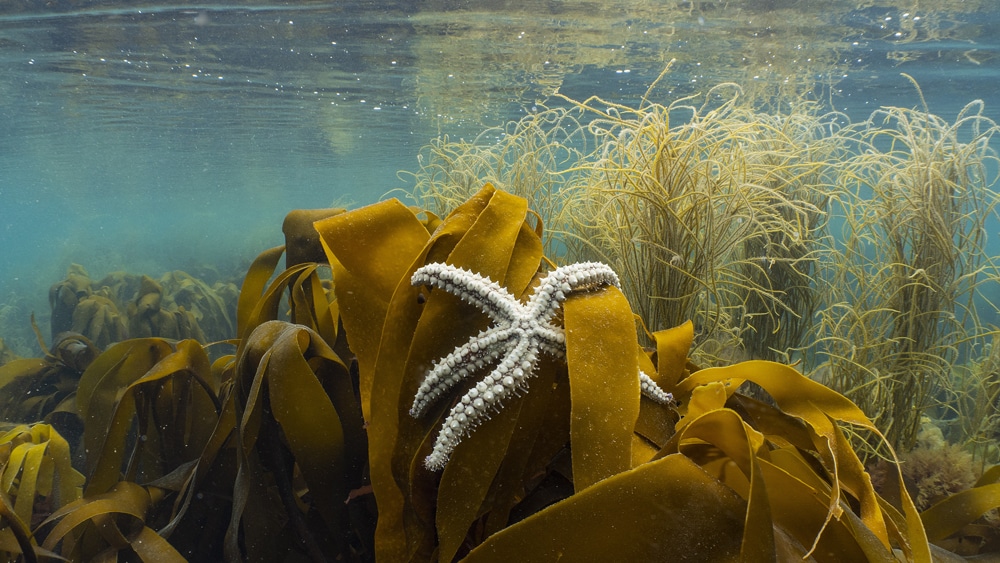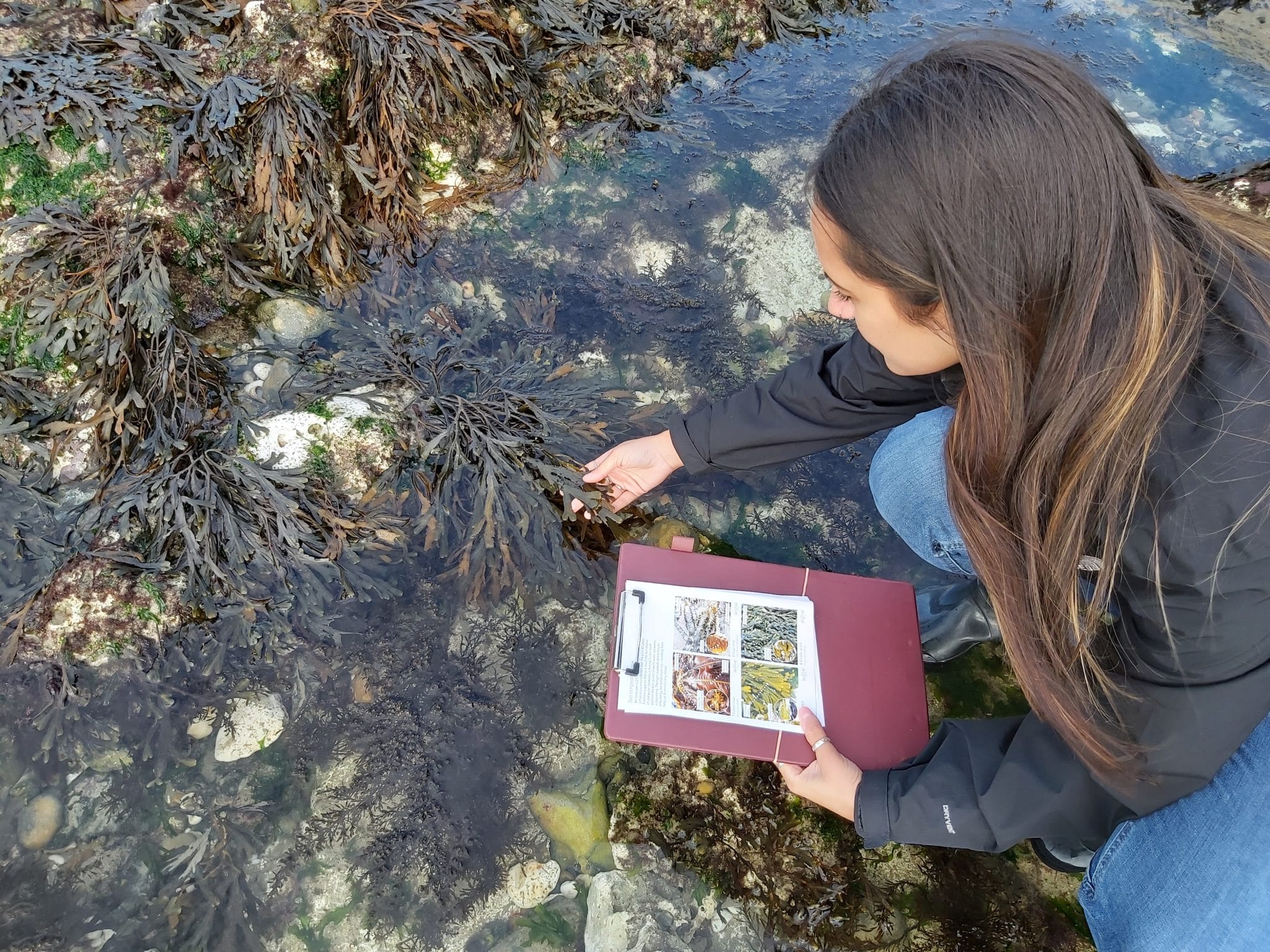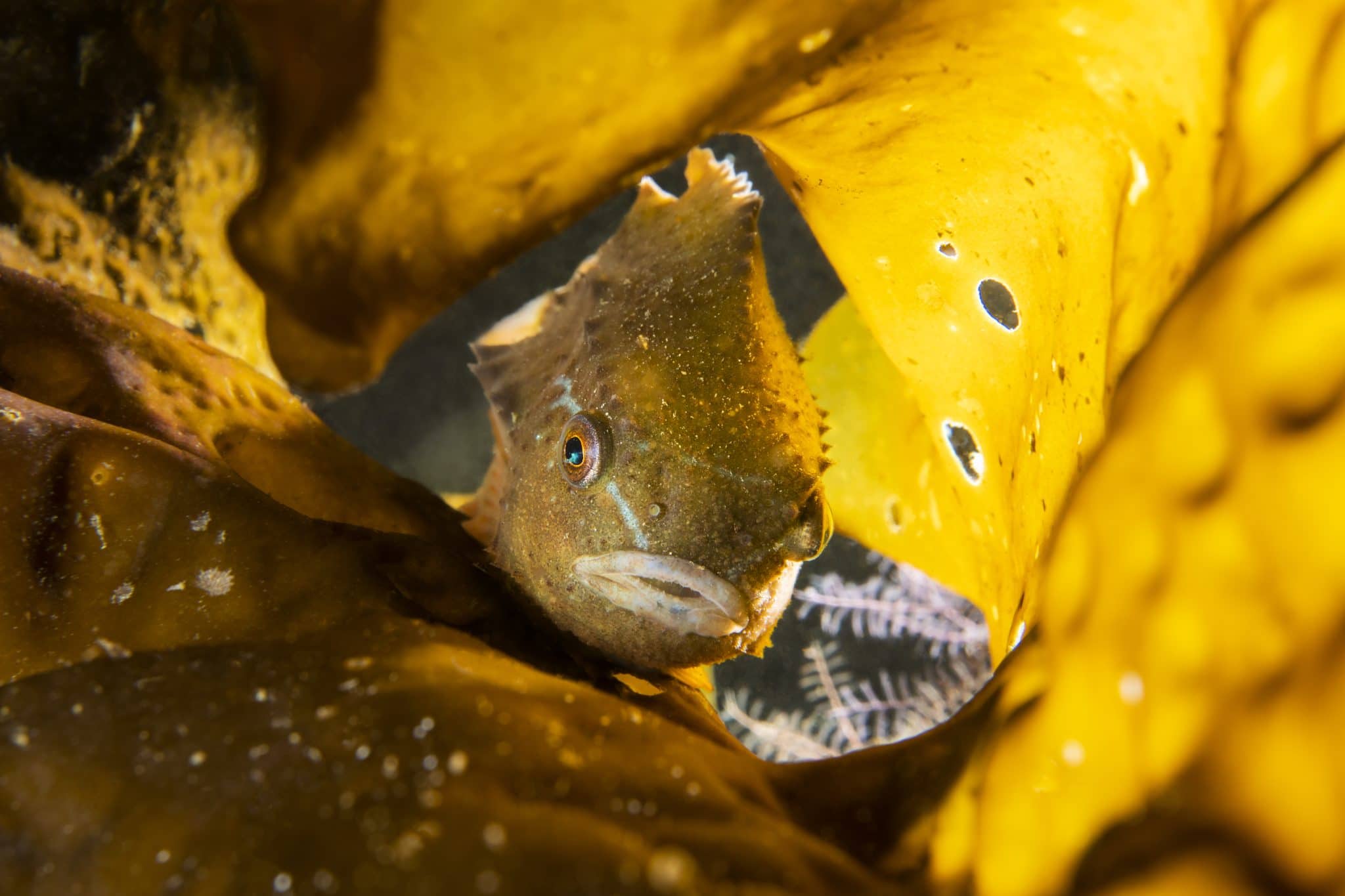Marine Life & Conservation
Big Seaweed Search Returns!

 From 23rd – 31st July 2022, the Marine Conservation Society and the Natural History Museum will be asking people across the UK to head to the coast and spot seaweed as part of community science project, Big Seaweed Search Week.
From 23rd – 31st July 2022, the Marine Conservation Society and the Natural History Museum will be asking people across the UK to head to the coast and spot seaweed as part of community science project, Big Seaweed Search Week.
Seaweed is one of the world’s great unsung heroes, playing a crucial role in marine ecosystems and helping to mitigate the effects of climate change. The UK, with over 650 species of seaweed, is home to a diverse range of species.
The Big Seaweed Search Week asks beachgoers to search for, and record, 14 of the most common seaweed species. This vital information helps the Marine Conservation Society and the Natural History Museum to map the distribution of specific species and collect long-term data that enables them to determine, as a result of seaweeds found, the impact of environmental changes in the ocean.
Amy Pilsbury, Citizen Science Lead at the Marine Conservation Society, said:“It’s easy for anyone to get involved in Big Seaweed Search Week – you don’t need to be a seaweed expert or live near the sea, just one visit to the coast will do. Studying seaweeds can tell us a lot about wider ocean and environmental conditions and the information supports real scientific research.
“Seaweed is a real ocean superstar, helping to buffer the effects of climate change, absorbing and storing carbon and protecting our coasts from waves and storm damage. The more data we gather with our Big Seaweed Searchers, the more knowledge and influence we have to protect our ocean, and seaweeds, for the future.”
As well as providing vital habitats for other species, seaweeds play a major part in marine food chains and are a rich source of nutrients for animals such as crabs and sea urchins.
Seaweed plays a critical role in combating the climate crisis. These fast-growing algae produce oxygen – more than land plants – with phytoplankton (like seaweed) providing at least half of the oxygen we breathe. Seaweed absorbs carbon more effectively than trees, storing an estimated 175 million tonnes each year – equal to 10% of the world’s car emissions.
However, populations of kelp – large brown seaweeds that are a vital ‘blue carbon’ store – are reported to be declining around the world, limiting ocean ecosystems’ abilities to absorb carbon and combat the climate crisis.
The Big Seaweed Search gathers information on species, such as kelp, which have the potential to be affected by rising sea temperatures, the arrival of non-native species and ocean acidification – environmental changes affecting the ocean and the health of marine ecosystems.
Data gathered by volunteers helps build a picture of what our shores are like, how they’re changing and informs scientists and decision-makers how best to protect them.
Juliet Brodie, Merit Researcher at the National History Museum, said:“It’s inspiring to see how the Big Seaweed Search is developing. We’re using the data submitted for our scientific research to build distribution maps which means we can track seaweed species as they respond to environmental changes over time. We’ve also been able to use over 1,000 submitted records in our work on a Red Data List of British seaweeds – which evaluates indigenous species and how endangered they are.”
It’s easy to get involved in Big Seaweed Search Week, and anyone can take part. Training videos and downloadable resources are available, including a guide which helps beachgoers to identify the seaweed species they’re likely to spot and explains what they need to do.
The survey can be carried out as an individual or in groups, and be completed on a mobile, tablet or computer.
To get involved simply:
- Register to take part and download your guide and recording form at bigseaweedsearch.org
- Choose your 5 metres[AB1] of coastline to survey
- Fill in your survey form
- Take LOTS of clear, close-up photographs for your survey to be accepted
- Submit your survey through bigseaweedsearch.org
You can visit the Marine Conservation Society for all the information you’ll need to get started.
Header Image: Paul Naylor
Marine Life & Conservation
Paul Watson Released as Denmark Blocks Japan’s Extradition Bid

Renowned anti-whaling activist Paul Watson has been released from custody in Greenland after spending five months in detention. Denmark’s Justice Ministry rejected Japan’s request for his extradition, citing insufficient guarantees that his time already served in custody would be credited against any potential sentence.
The 74-year-old Canadian-American was arrested on July 21 in Nuuk, Greenland’s capital, when his ship docked to refuel. His arrest was based on a 2012 Japanese warrant related to a 2010 encounter in Antarctic waters. Japan alleged Watson obstructed operations and caused damage to a whaling research ship during efforts to disrupt illegal whaling. Watson has consistently denied these claims, maintaining his commitment to marine conservation.
Denmark, which oversees extradition matters for Greenland, concluded that while the legal conditions for extradition were met, the lack of assurances from Japan regarding time-served credit made extradition untenable.
In a video shared by his foundation, Watson expressed gratitude and relief, saying, “After five months, it’s good to be out… and good to know they’re not sending me to Japan.” He added that the most difficult part of his time in custody was being separated from his two young sons.
Watson is a pioneering figure in marine conservation, known for founding the Captain Paul Watson Foundation in 2022 after decades of activism with the Sea Shepherd Conservation Society. His bold efforts to defend marine life have earned him widespread support, including from celebrities and conservationists. His work has also been featured in the acclaimed reality TV series Whale Wars.
Watson’s lawyer, Jonas Christoffersen, praised the decision, stating, “We are happy and relieved that Paul Watson is now free.” He added that Watson is eager to reunite with his family and continue his vital work.
The arrest occurred while Watson’s vessel, the M/Y John Paul DeJoria, was en route to the North Pacific with a team of 26 volunteers to intercept a Japanese whaling ship. His foundation described the arrest as politically motivated and emphasized that Watson’s actions were focused on ending illegal whaling practices.
Japan resumed commercial whaling in 2019 after leaving the International Whaling Commission, asserting that whale meat is a cultural tradition. Conservationists, however, continue to challenge these practices, highlighting their impact on marine ecosystems.
Despite the challenges, Watson remains steadfast in his mission to protect marine life and bring attention to whaling practices. His dedication to ocean conservation has made him a globally respected advocate for the environment.
Marine Life & Conservation
12 Days of Zero-Waste Fish-mas

This holiday period, the Marine Conservation Society, the UK’s leading ocean membership charity, invites you to make some simple changes to eating fish this Christmas to help our seas.
Dr Kenneth Bodles, Head of Fisheries and Aquaculture at the Marine Conservation Society, said, “During the festive season, our consumption increases, but so does waste. Sustainability isn’t just about where food comes from – it’s also about how you use it. By reducing waste and making the most out of your seafood, you’re not only taking steps to be more ocean-friendly, but can also help to cut costs during what is often one of the most expensive times of the year”.
The Marine Conservation Society has compiled twelve tips on how to consume seafood sustainably with zero-waste this Christmas:
Buy whole fish instead of fillets
Instead of fillets, consider buying whole fish such as salmon, hake, or lemon sole. By adopting a “nose to tail” approach with cooking, whole-baked fish not only feeds a crowd, but also helps to minimise waste and maximise sustainability by using up every part of the animal, including bones, skin, and fat.
Make fish stock
Leftover fish bones or shells can be put to good use by boiling them to make a nourishing fish stock or bisque. This can be frozen and preserved for later use and makes for a flavourful base in a soup.
Make your own fish pâté
Avoid waste by turning leftover fish, such as smoked mackerel or salmon, into a delicious pâté by blending with cream cheese and lemon. Perfect when paired with crackers.
The sustainability of salmon and mackerel varies depending on where and how it is caught or farmed. For more information on green-rated options, check the charity’s Good Fish Guide.
Buy frozen
By purchasing seafood that is frozen or vacuum-packed, this helps to reduce waste by extending the shelf life of your food.
Fish pie
If you’re wondering what to do with leftover cooked fish, why not opt for a classic fish pie with mashed potatoes, leeks, and a cheesy sauce? A sure crowd pleaser on Boxing Day.
Use the head
Don’t forget the fish head! The meat is incredibly tender and flavourful. The charity recommends a cod’s head curry or recreating Fallow’s renowned cod’s head in siracha butter.
By stretching your ingredients further, not only is this a more sustainable way to enjoy seafood, but also cost-effective by repurposing leftovers and cooking creatively.
Boxing Day brunch
Mix leftover kippers or smoked salmon with scrambled eggs for a tasty, zero-waste, Boxing Day brunch.
For best choice, make sure you buy kippers, or herring, from the North Sea and the North Irish Sea.
Zero-waste storage
A top tip from the Marine Conservation Society to avoid waste is freezing fish offcuts to save for future use.
Crisp up the skin
Even leftover fish skin can be turned into a quick savoury snack by crisping it up in an air fryer with a little olive oil and salt.
Anchovies two ways
Leftover anchovies can either be blended with butter to make a delicious anchovy butter or tossed into pasta for a hit of umami flavour.
The charity recommends opting for anchovies caught in the Bay of Biscay for best choice.
Fishcakes
For an easy, zero-waste meal, leftover seafood trimmings can be mixed with mash and fried in breadcrumbs to make fishcakes.
Pickled mussels
Try pickling mussels in 1:1 vinegar and water, with a dash of sugar for a sustainable, zero-waste snack that can be enjoyed well beyond the festive season.
Mussels farmed in the UK are a seafood superhero. Grown using low-impact methods and harvested by hand, they get all the food they need from the sea around them. This makes them one of the most sustainable, ocean-friendly, and cost-effective seafood options.
Players of People’s Postcode Lottery have raised £6.6M towards the Marine Conservation Society’s vital work in making seafood more sustainable.
Laura Chow, Head of Charities at People’s Postcode Lottery, said: “Fish is a festive favourite for many, but making sustainable choices when it comes to how we buy and eat seafood makes all the difference for our ocean. Support from players of People’s Postcode Lottery has helped the Marine Conservation Society further its sustainable seafood work, so that we can all enjoy healthier, better protected seas.”
The Marine Conservation Society encourages you to make sustainable seafood choices a year-round habit, not just for Christmas. To check how sustainable the seafood on your plate is, you can visit the charity’s Good Fish Guide. The Guide helps consumers and businesses identify the most sustainable seafood using a simple traffic light system, based on where and how species are caught or farmed. Green is the best choice, amber means improvements are needed, and red indicates fish to avoid buying.
Zero-waste gift idea
Why not embrace a zero-waste Christmas by gifting a membership to support marine conservation? It’s a meaningful, low-waste gift that helps protect our ocean for generations to come. Memberships start from as little as £5 a month – the price of a sandwich and drink from your local coffee shop.
Find the latest sustainable seafood advice for wild-caught and farmed seafood on the Good Fish Guide, downloadable to your phone from www.mcsuk.org/goodfishguide.
-

 News2 months ago
News2 months agoIconic SS United States to become the World’s Largest Artificial Reef
-

 News3 months ago
News3 months agoBook Review – 52 Assignments: Underwater Photography
-

 Gear News3 months ago
Gear News3 months agoDYNAMICNORD – New German diving brand enters the British market
-

 News3 months ago
News3 months agoExploring Cenote El Pit: A Diver’s Dream
-

 Gear News3 months ago
Gear News3 months agoTry BARE drysuits (and maybe even win one!) this Friday with Sea & Sea at North West Dive Fest
-

 Marine Life & Conservation3 months ago
Marine Life & Conservation3 months agoBook Review: Coral Triangle Cameos
-

 Blogs2 months ago
Blogs2 months agoDive the Egyptian Red Sea this Autumn with Regaldive
-

 News3 months ago
News3 months ago2024 Ocean Art Underwater Photo Competition Announced

















